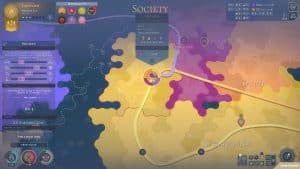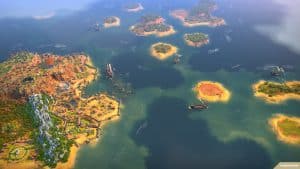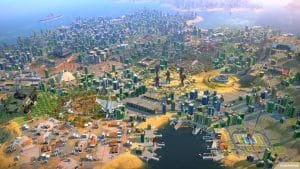Humankind
Related Games
Description
🔥 What is Humankind for PC
Humankind is a grand historical strategy game developed by Amplitude Studios and published by SEGA, designed as a bold reimagining of the 4X genre where players shape the course of civilization from the Neolithic era to the modern age. Unlike traditional historical strategy games that follow pre-determined civilizations, Humankind allows you to craft your own unique culture by blending multiple historical societies into one evolving identity. This creative structure makes every campaign a personalized journey through human history.
In Humankind, your decisions define not only your empire’s political and technological path but also its moral and philosophical character. You can start as the humble Babylonians, evolve into the industrious Romans, and later transform into the scientific Japanese, creating an entirely original combination of strengths and aesthetics. Each transition between eras brings new strategic opportunities but also moral dilemmas about expansion, warfare, and diplomacy.
The game’s overarching narrative is one of progress and legacy how your choices, both great and small, echo through the centuries. It invites players to reflect on how cultures borrow, adapt, and evolve rather than remain fixed in time. This emphasis on creativity, adaptability, and consequence gives Humankind its distinctive philosophical weight, elevating it beyond simple empire-building into a reflective experience on what it means to shape history.
👉 Features of Humankind
Dynamic Civilization Creation
Humankind replaces static factions with a flexible civilization system that evolves as you progress through eras. Instead of choosing one civilization for the entire campaign, you can merge traits from over sixty cultures across six major historical periods, forming a civilization that reflects your playstyle. This mechanic encourages experimentation and diversity, ensuring that no two games ever unfold in the same way.
Each culture offers unique bonuses, units, and architectural styles that visually alter your cities. The blending of cultural aesthetics and mechanical advantages makes empire progression feel organic, rewarding creativity and strategic foresight in equal measure.
Morality and Reputation System
Every action in Humankind contributes to your fame score, a measure of your civilization’s legacy that determines victory. Unlike typical conquest-oriented systems, fame rewards achievements across multiple domains military, cultural, scientific, and diplomatic making alternative paths to greatness equally viable.
Morality and reputation play subtle yet impactful roles in diplomacy. Your civilization’s behavior whether honorable, aggressive, or opportunistic affects how AI empires react to you. These emergent interactions often create unexpected alliances and rivalries that feel genuinely human rather than scripted.
Deep City-Building and Infrastructure
City-building in Humankind emphasizes terrain interaction and regional specialization. Each tile’s geography and resource distribution matter, encouraging thoughtful planning. Constructing districts, wonders, and strategic improvements transforms landscapes into living testaments to your culture’s ambitions.
Overcrowding and pollution also become pressing concerns as you advance through the eras. Managing population growth, food supplies, and industrial output requires careful balance. This focus on sustainability and spatial management gives Humankind’s cities a palpable sense of growth and consequence.
Tactical Battles on the World Map
Combat in Humankind plays out directly on the campaign map, merging strategic and tactical gameplay. Battles unfold over multiple turns, allowing players to position units, exploit terrain advantages, and use elevation or weather to shift the tide. The ability to reinforce ongoing battles with nearby armies adds dynamism and realism to warfare.
This system prevents combat from feeling abstract and ensures that geography rivers, forests, and hills matters deeply. Every engagement becomes a miniature strategy puzzle rather than a quick dice roll, rewarding patience and foresight.
Artistic and Philosophical Presentation
Amplitude Studios has infused Humankind with a strong artistic identity that blends historical reverence with modern sensibility. The narrator’s reflective tone, the painterly world map, and the cultural score composed by Arnaud Roy all work together to evoke a sense of human achievement and melancholy.
The music evolves as your civilization advances, echoing the cultural transitions you’ve shaped. Whether through a solemn medieval chant or a soaring orchestral crescendo, the soundscape underlines the emotional rhythm of progress and loss that defines the game.
Gameplay
Civilization Evolution and Strategic Identity
Humankind’s defining gameplay mechanic is its fluid civilization evolution. You begin as a tribe of nomads and gradually build a settled society through exploration, resource gathering, and territorial expansion. As each era dawns, you select a new culture that adds fresh abilities and redefines your strategic direction.
This system rewards adaptability and foresight. A player who starts with a militaristic civilization might later pivot toward science or trade, reinventing their identity without losing accumulated strengths. It’s a remarkably flexible system that mirrors real-world cultural evolution.
Exploration, Expansion, Exploitation, and Extermination
The traditional 4X pillars explore, expand, exploit, exterminate are all present but reinterpreted through the game’s moral and aesthetic lens. Exploration feels meaningful because each discovery contributes to fame, while expansion must be weighed against stability and diplomacy.
Territory disputes, population pressures, and environmental challenges make decision-making complex. You can pursue peaceful coexistence through trade and cultural influence or pursue aggressive dominance through war and colonization. Either path has tangible effects on your legacy and moral standing.
Diplomacy and Cultural Influence
Diplomacy in Humankind operates through an evolving system of treaties, grievances, and influence. Cultures can absorb others peacefully through ideological sway rather than conquest, introducing a soft-power alternative to traditional expansion.
Your empire’s ideology shaped by events and decisions affects domestic stability and international relations. Adopting collectivist or individualist principles, for instance, influences both internal policies and how other empires perceive you. These interactions add depth and personality to global politics.
Wonders and Era Stars
Each era features a series of wonders that symbolize humanity’s greatest achievements. Constructing them not only grants bonuses but also anchors your civilization’s story within a recognizable historical context.
Meanwhile, Era Stars mark milestones in domains like science, warfare, and economy. Earning enough stars allows you to progress to the next age, making fame accumulation both your score and your narrative compass. These mechanics intertwine competition with introspection, keeping progression steady and emotionally engaging.
Graphics
Historical Aesthetics and World Design
Humankind’s world design blends stylized realism with painterly textures that give the map a tactile, storybook quality. Cities sprawl across landscapes organically, reflecting the architectural styles of the cultures you adopt. Rivers shimmer, mountain peaks glow at sunrise, and forests sway gently in the wind, creating a living tableau of human progress.
Every new cultural layer brings architectural transformations. The shift from clay huts to marble temples and glass skyscrapers provides visible proof of evolution, turning your map into a dynamic record of civilization’s journey.
Artistic User Interface
The UI is elegant, responsive, and filled with thematic details that evoke historical manuscripts and atlases. Tooltips and menus are adorned with decorative motifs and soft parchment textures, helping the interface feel immersive without sacrificing clarity.
Color-coded icons and adaptive layouts make even complex systems intuitive. This thoughtful design keeps the player grounded in the experience rather than overwhelmed by data.
Audio and Atmosphere
The orchestral soundtrack evolves alongside your civilization, shifting from tribal percussion to symphonic grandeur. Ambient sounds market chatter, animal calls, battle cries change depending on your environment and technological level, enriching immersion.
The narrator’s calm, almost philosophical commentary adds warmth and cohesion to the experience. His reflections on human ambition and folly make the journey feel personal, as though you are writing history together.
Pros and Cons
✔️ Pros
- Innovative civilization evolution system that rewards creativity and adaptability
- Gorgeous art direction with painterly visuals and evolving architecture
- Deep tactical battles that integrate naturally into the world map
- Strong philosophical themes and reflective narration
- Flexible victory conditions emphasizing legacy rather than domination
❌ Cons
- AI diplomacy and combat decisions can sometimes feel inconsistent
- Late-game pacing may slow due to complex management layers
- City micromanagement can become overwhelming in large empires
ℹ️ Game information
Release Date: 17/08/2021
Update Date: 05/12/2025
Version: v1.0.29.4742
Genre: Strategy
Platform: PC
Language: ![]()
![]()
![]()
![]()
![]()
![]()
![]()
![]()
Weight: 25 GB
Additional info: New version includes all DLCs to date
⭐ Installation Instructions
- The game is fully complete, you just need to install it, so there is no need to unpack it or download it from other sources.
- Just run the Humankind.exe installation file.
- Simply launch the game from shortcut desktop.
⚙️ System Requirements
✅ Minimum:
- OS: Windows 7 64-bit
- Processor: Intel i5 4th generation / AMD FX-8300
- Memory: 8 GB RAM
- Graphics: NVIDIA GTX 770 / AMD R9 290
- DirectX: Version 11
- Network: Broadband Internet connection
- Storage: 25 GB available space
✅ Recommended:
- OS: Windows 7 64-bit
- Processor: Intel i5 6th generation / AMD Ryzen 5 1600
- Memory: 8 GB RAM
- Graphics: NVIDIA GTX 1060 / AMD RX 5500-XT
- DirectX: Version 11
- Network: Broadband Internet connection
- Storage: 25 GB available space
Images






